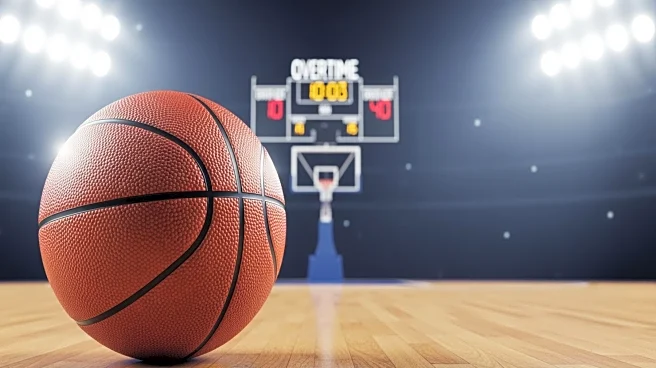What's Happening?
In a strategic move during their game against Northwestern, the University of Southern California (USC) Trojans executed a fake punt that contributed to their 38-17 victory. The play involved third-string quarterback Sam Huard, who donned the same jersey
number as the team's punter, Sam Johnson. Huard, wearing No. 80, completed a 10-yard pass to Tanook Hines, extending a drive that culminated in a touchdown run by Jayden Maiava. This tactic was legally executed, as Huard's number change was officially listed on the game day roster, although it went unnoticed by the opposing team. Northwestern's coach, David Braun, acknowledged the cleverness of USC's strategy, noting it as a lesson learned for future games.
Why It's Important?
The successful execution of the fake punt highlights the importance of strategic planning and adaptability in college football. USC's ability to leverage roster rules to their advantage demonstrates the depth of tactical thinking within the team, potentially setting a precedent for other teams to explore similar strategies. This move not only contributed to USC's victory but also showcased the creative capabilities of their coaching staff, led by Lincoln Riley. For Northwestern, the incident serves as a reminder of the need for thorough preparation and attention to detail, which could influence their approach in future games.
What's Next?
Following this game, USC may continue to explore unconventional strategies to gain competitive advantages in upcoming matches. The incident could prompt other teams to scrutinize game day rosters more closely, ensuring they are aware of any potential surprises. Northwestern, in particular, might revise their pre-game procedures to prevent similar oversights. As the college football season progresses, teams will likely be more vigilant in their preparations, potentially leading to more innovative plays and heightened competition.
Beyond the Headlines
The use of a fake punt involving a jersey number change raises questions about the ethical boundaries of sportsmanship and the extent to which teams can manipulate rules for strategic gain. While the move was within legal bounds, it challenges traditional notions of fair play and could spark discussions about the need for clearer regulations regarding roster changes. This development may influence future rule-making decisions in college football, as governing bodies seek to balance creativity with fairness.















